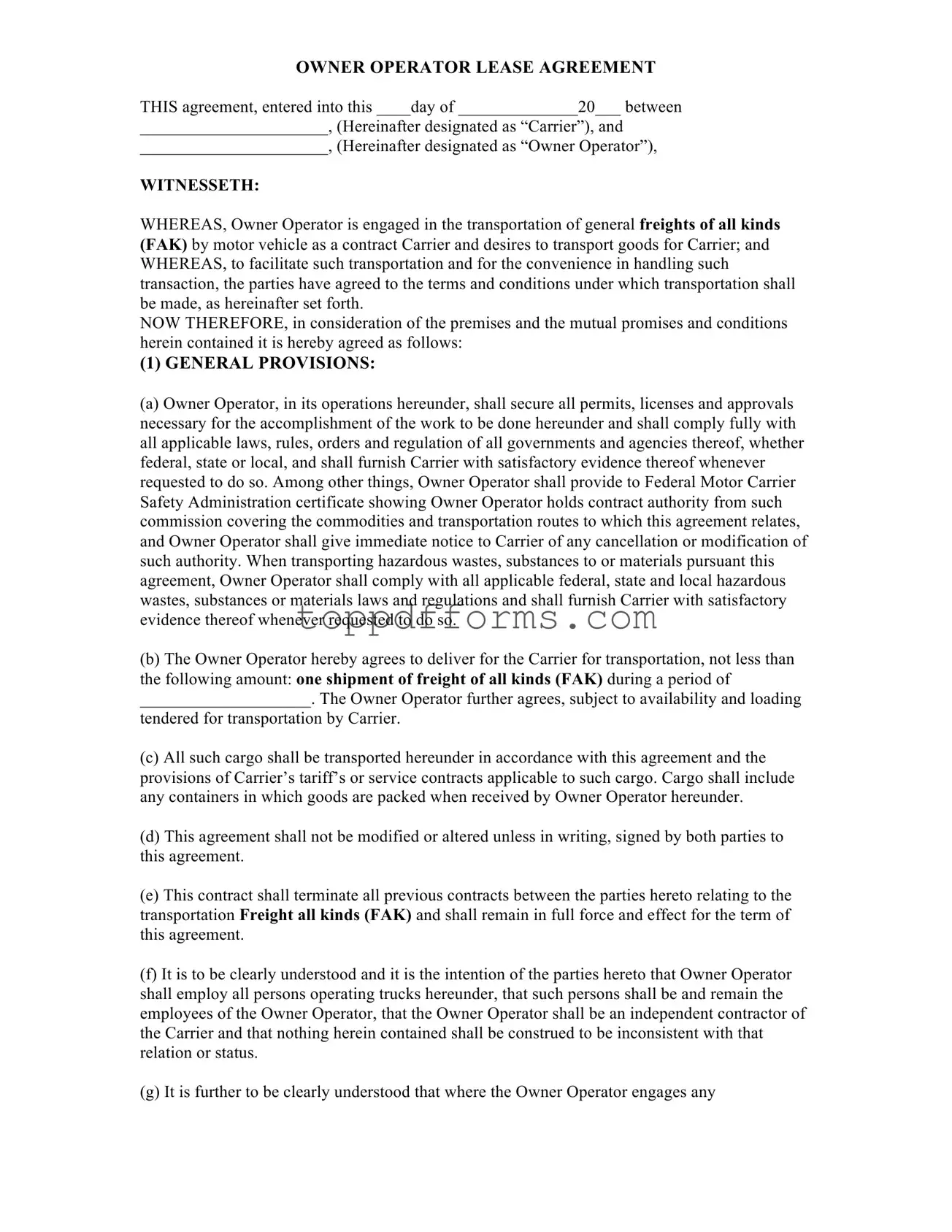Free Owner Operator Lease Agreement Form
Things You Should Know About This Form
What is an Owner Operator Lease Agreement?
An Owner Operator Lease Agreement is a formal contract between a Carrier and an Owner Operator. This document outlines the terms and conditions under which the Owner Operator will transport goods for the Carrier. It includes details about responsibilities, liabilities, and the rights of both parties, ensuring that all necessary permits and regulations are adhered to during the transportation process.
What are the key responsibilities of the Owner Operator?
The Owner Operator must secure all necessary permits, licenses, and approvals to operate legally. They are responsible for complying with federal, state, and local laws. Additionally, the Owner Operator must transport goods safely and promptly, provide written receipts for all deliveries, and maintain insurance coverage that meets regulatory requirements. They also assume liability for any loss or damage to goods while in their care.
How is compensation determined in this agreement?
Compensation for the Owner Operator is based on the rates and charges outlined in the attached rate schedule. The Carrier agrees to pay the Owner Operator within sixty days of the invoice date. The specifics of the commodities transported and the points of origin and destination are also detailed in this schedule, ensuring clarity and transparency in financial matters.
Can the Owner Operator assign their responsibilities to another party?
No, the Owner Operator cannot assign their responsibilities under this agreement to another party without obtaining written consent from the Carrier. This clause ensures that the Carrier maintains control over who is handling their goods and that all parties involved are properly vetted and compliant with the terms of the agreement.
What happens if there is a conflict between this agreement and other documents?
In the event of a conflict between this Owner Operator Lease Agreement and any other document, such as a bill of lading or tariff, the terms of this agreement will prevail. This provision ensures that the rights and obligations outlined in the Owner Operator Lease Agreement are upheld, providing a clear framework for both parties to follow.
File Information
| Fact Name | Details |
|---|---|
| Parties Involved | This agreement is between a Carrier and an Owner Operator, both of whom are essential to the transportation process. |
| General Provisions | The Owner Operator must secure all necessary permits and comply with applicable laws, ensuring safe and legal transportation. |
| Independence of Contractor | The Owner Operator is classified as an independent contractor, meaning they have autonomy in their operations. |
| Liability Assumption | Owner Operators assume liability for the goods during transportation, including any hazardous materials, and must indemnify the Carrier for any related issues. |
| Insurance Requirements | Owner Operators must carry insurance that meets federal and state requirements, including cargo and liability coverage. |
| Assignment Restrictions | The contract cannot be assigned by the Owner Operator without written consent from the Carrier, ensuring control over the agreement. |
| Compensation Structure | Owner Operators are compensated based on a rate schedule, with payment due within sixty days of invoicing. |
| Confidentiality Clause | All terms of the agreement and Carrier business information must remain confidential unless consent is given for disclosure. |
| Governing Law | This agreement is subject to the laws of the state specified within the document, ensuring legal clarity and enforcement. |
Common mistakes
Filling out the Owner Operator Lease Agreement form can be straightforward, but there are common mistakes that people often make. One major error is failing to provide complete information. Ensure that all sections of the form are filled out accurately. Missing details can lead to delays or misunderstandings later on.
Another frequent mistake is not reading the entire agreement before signing. It's crucial to understand all terms and conditions. Skipping this step can result in unforeseen obligations or liabilities that could have been avoided.
People often overlook the importance of keeping copies of the signed agreement. After signing, make sure to retain a copy for your records. This can be invaluable in case of disputes or if clarification is needed in the future.
Many individuals fail to check for proper signatures. Both the Owner Operator and Carrier must sign the document for it to be valid. An unsigned agreement is essentially unenforceable.
Another common error is not noting the date correctly. The date of the agreement is essential for establishing the terms of service and duration. Make sure to fill this out accurately to avoid confusion later.
People sometimes neglect to review the insurance requirements. The Owner Operator must comply with specific insurance standards. Failing to do so can lead to liability issues down the line.
It is also important to clarify payment terms. Ensure that the compensation structure is clearly defined and understood. Ambiguities in payment can lead to disputes and financial strain.
Another mistake is ignoring confidentiality clauses. Understanding what information can and cannot be shared is crucial. Breaching confidentiality can have serious repercussions.
Some individuals forget to provide necessary documentation along with the agreement. If the form requests specific permits or licenses, make sure to include them to avoid delays.
Lastly, people often assume verbal agreements are sufficient. All terms must be documented in writing. Relying on verbal promises can lead to misunderstandings and legal issues.
Popular PDF Forms
Girlfriend Application - Eager to form a bond that’s supportive and understanding.
To simplify the transaction process, you can utilize various resources available online, including the PDF Templates that provide structured formats for your Trailer Bill of Sale, ensuring all necessary information is captured accurately.
Broker Price Opinion Template - It provides a snapshot of the competitive landscape for similar homes.
Fake Light Bill - The Utility Bill form can ease the process of switching providers.
